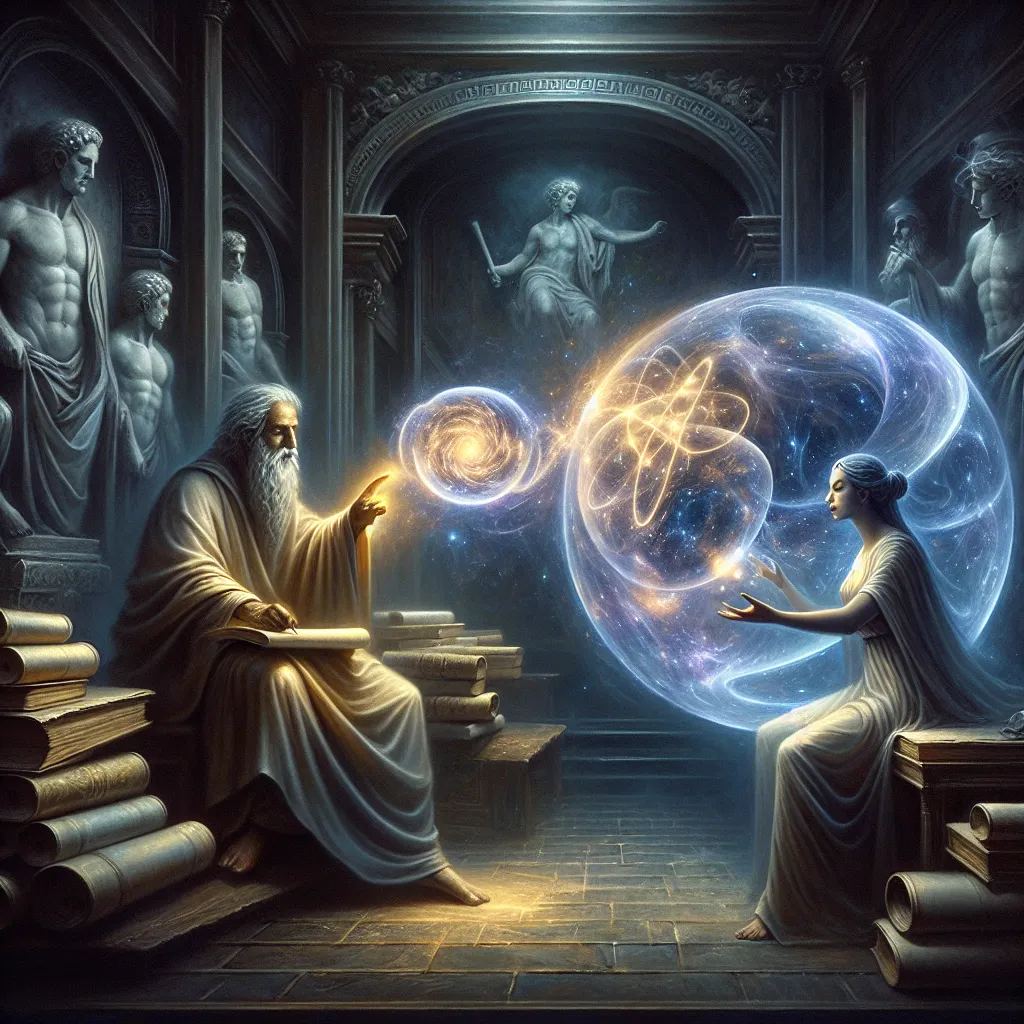
- Published on
- Authors

- Name
- You
The Influence of Platonism on Gnosticism
In the vast tapestry of Western mysticism and esoteric traditions, two threads stand out in their intricate weaving of thought and spirituality: Platonism and Gnosticism. Journey with me as we unravel the rich philosophical and mystical confluence between these two venerable traditions, revealing the transformative beauty of their union.
The Intellectual Landscape of Ancient Thought
| Tradition | Key Concepts | Notable Figures |
|---|---|---|
| Platonism | Theory of Forms, Dualism, the Demiurge | Plato, Plotinus |
| Gnosticism | Divine Spark, Pleroma, Sophia | Valentinus, Basilides |
Platonism: The Realm of Ideal Forms
Plato, the eminent Greek philosopher, introduced the notion of a transcendental reality populated by perfect, immutable Forms or Ideas. This dualistic worldview sharply distinguishes between the imperfect physical world and the flawless, eternal realm of Forms. At the center of this metaphysical structure stands the Demiurge, a benevolent craftsman who shapes the material cosmos, bringing order to chaos.
Gnosticism: The Journey of the Divine Spark
Gnosticism, rising in the early centuries CE, unfolded as a mystical path seeking the arcane knowledge (gnosis) of divine realities. It speaks of a fragmented universe where sparks of the divine Pleroma (Fullness) are trapped in the imprisoning shell of matter. The key to salvation, according to Gnostic thought, lies in awakening the divine spark within and reuniting it with the Pleroma, often facilitated by the celestial figure of Sophia (Wisdom).
Metaphysical Intersections
The Demiurge: Craftsman or Cosmic Jailor?
One of the most striking confluences is the concept of the Demiurge. In Platonism, the Demiurge is a supreme artisan who orders the cosmos. Gnostic reinterpretation twists this figure into a more sinister, often ignorant or malevolent being, trapping the divine sparks within the flawed creation.
| Aspect | Platonic Demiurge | Gnostic Demiurge |
|------------------------|-----------------------------------------|------------------------------------|
| **Role** | Cosmic Craftsman | Ignorant/Malevolent Jailor |
| **Creation** | Ordered and Rational | Flawed and Entrapping |
| **View of Matter** | Neutral/Positive | Negative/Corrupt |
The Divine Spark and the Soul
Platonism and Gnosticism share a profound belief in the soul's higher origin and its potential return to a divine source. Plato's myth of the cave, where the soul ascends from the shadows of the empirical world to the light of the Forms, parallels the Gnostic soul's journey from ignorance to gnosis.
Spiritual Practices and Mystical Union
The Ascent of the Soul
For both traditions, spiritual practice focuses on the soul's ascent back to its divine origin. Platonic thought emphasizes rational contemplation and ethical purification. Conversely, Gnostic practices often include rituals, secret teachings, and ecstatic experiences to liberate the divine spark from its material prison.
Intermediary Beings and Saviors
Both paths speak of intermediary beings aiding the soul's ascent. In Platonism, these may be the Forms themselves or guiding daimons. Gnosticism introduces a plethora of celestial helpers, with Sophia playing a pivotal salvific role.
| Tradition | Intermediary Beings | Role |
|-------------|---------------------------------------------------|-----------------------------------------|
| **Platonism** | Daimons, Forms | Guides for Contemplation and Ascent |
| **Gnosticism** | Aeons, Sophia | Liberators of the Divine Spark |
Conclusion: A Harmonious Tapestry
The influence of Platonism on Gnosticism is a testament to the profound interwoven nature of human thought and spirituality. By blending these streams, we can trace a path that leads from the philosophical abstractions of the Academy to the esoteric depths of Gnostic mystery schools. This journey enriches our understanding, reminding us that the quest for truth and the divine is a timeless pursuit that transcends the boundaries of time and tradition.
Embrace this exploration, dear seeker, for in the harmony of these ancient wisdoms, the divine spark within each of us may find its guiding light back to the Source.
Embark on more journeys into mysticism and ancient wisdom at our Occult Library . Let's explore the unknown, together.
